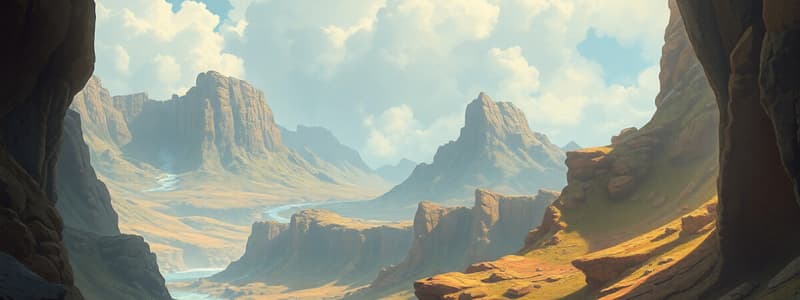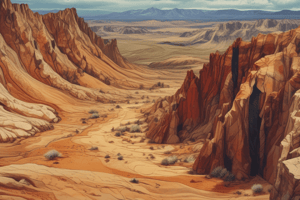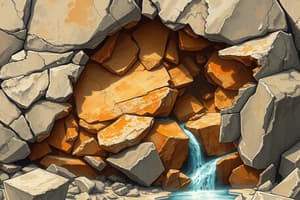Podcast
Questions and Answers
What is mechanical weathering primarily caused by?
What is mechanical weathering primarily caused by?
- Metamorphic processes
- Physical means acting on rocks (correct)
- Radiation from the sun
- Chemical reactions in the environment
Which of the following is a type of mechanical weathering?
Which of the following is a type of mechanical weathering?
- Thermal expansion (correct)
- Oxidation
- Dissolution
- Hydrolysis
What is the primary cause of thermal expansion weathering in rocks?
What is the primary cause of thermal expansion weathering in rocks?
- The presence of living organisms
- Rapid temperature changes (correct)
- Rocks being exposed to water
- High pressure within the Earth
Which factor is NOT a cause of mechanical weathering?
Which factor is NOT a cause of mechanical weathering?
How do sharp angular fragments known as grus form?
How do sharp angular fragments known as grus form?
What role does ice play in mechanical weathering?
What role does ice play in mechanical weathering?
What process describes the expansion of water trapped in rock cracks that leads to rock weathering?
What process describes the expansion of water trapped in rock cracks that leads to rock weathering?
What is exfoliation in the context of mechanical weathering?
What is exfoliation in the context of mechanical weathering?
What triggers exfoliation weathering in bedrock?
What triggers exfoliation weathering in bedrock?
Which of the following is NOT considered a physical cause of mechanical weathering?
Which of the following is NOT considered a physical cause of mechanical weathering?
What effect do salt crystals have on rocks during salt crystal growth weathering?
What effect do salt crystals have on rocks during salt crystal growth weathering?
Mechanical weathering can be influenced by which of the following?
Mechanical weathering can be influenced by which of the following?
Which of the following describes biological weathering?
Which of the following describes biological weathering?
What is one effect of abrasion weathering on rocks?
What is one effect of abrasion weathering on rocks?
What effect does thermal expansion have on rocks?
What effect does thermal expansion have on rocks?
Flashcards
Thermal Expansion Weathering
Thermal Expansion Weathering
Mechanical weathering caused by repeated expansion and contraction of rock due to temperature changes.
Frost Weathering (Ice Wedging)
Frost Weathering (Ice Wedging)
Mechanical weathering caused by water freezing and expanding in cracks of rocks.
Exfoliation Weathering
Exfoliation Weathering
Mechanical weathering where outer layers of rock peel off due to pressure release.
Abrasion Weathering
Abrasion Weathering
Signup and view all the flashcards
Salt Crystal Growth Weathering
Salt Crystal Growth Weathering
Signup and view all the flashcards
Biological Weathering
Biological Weathering
Signup and view all the flashcards
Grus
Grus
Signup and view all the flashcards
Mechanical Weathering
Mechanical Weathering
Signup and view all the flashcards
Causes of Mechanical Weathering
Causes of Mechanical Weathering
Signup and view all the flashcards
Frost Wedging/Wedging
Frost Wedging/Wedging
Signup and view all the flashcards
Exfoliation
Exfoliation
Signup and view all the flashcards
Abrasion
Abrasion
Signup and view all the flashcards
Salt Weathering
Salt Weathering
Signup and view all the flashcards
Study Notes
Mechanical Weathering
- Mechanical weathering breaks down rock physically, not chemically.
- External environmental factors physically break and chip away at the rock.
Causes of Mechanical Weathering
- Water
- Ice
- Salt/mineral crystals
- Pressure release
- Extreme temperatures
- Wind
- Plants
- Animals
Types of Mechanical Weathering
- Thermal Expansion: Changes in temperature cause rocks to expand and contract, creating stress that breaks them apart. This is common in desert climates, leading to angular rock fragments (grus).
- Frost Weathering/Ice Wedging: Water seeps into cracks, freezes, expands, and widens the cracks. This is a significant factor in cold climates.
- Exfoliation: Outer layers of bedrock peel away due to pressure release as the rock rises to the surface. This is seen in exposed, rising rock formations.
- Abrasion: Rocks grinding against each other (due to wind, water, glaciers). This process rounds and smooths rock edges.
- Salt Crystal Growth: Salts crystallize within rock cracks, expanding them and weakening the rock. Common in hot, dry or coastal areas.
Biological Weathering
- Living organisms, including plants, animals, fungi, and microorganisms, mechanically or chemically break down rock.
- Plant roots growing into cracks, burrowing animals, and organisms secreting acids all contribute to biological weathering.
Studying That Suits You
Use AI to generate personalized quizzes and flashcards to suit your learning preferences.
Description
Explore the fascinating world of mechanical weathering, which breaks down rocks through physical means rather than chemical changes. This quiz covers various causes and types of mechanical weathering, including thermal expansion, frost weathering, and abrasion. Test your understanding of these processes and their significance in shaping our geological landscape.




